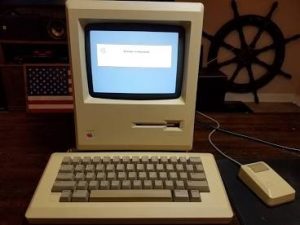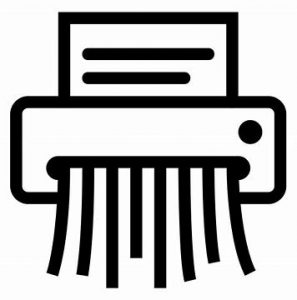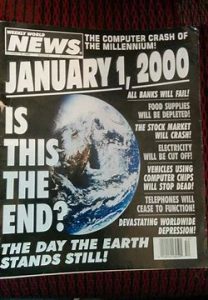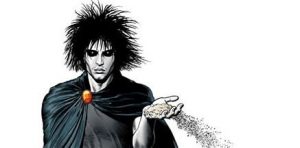
 1962 — Wonder. Worked a summer job in the meteorology department at MIT, entering delicately penned weather data from 1876 to 1954 onto punch cards. I would then take a stack of cards to Wes, the wry, sarcastic grad student who studied with Tom Lehrer and was assisting my neighbor, Professor Hurd Willett, a world-renowned authority on long-range weather forecasting, in tabulating the minutiae I had gathered. Then he would fire up a large, gray IBM computer the size of the WOPR in “War Games,” feed the cards into the machine, generating a shuffling racket at the decibel level of a textile mill running at full capacity, and adding another statistical line on a graphic.
1962 — Wonder. Worked a summer job in the meteorology department at MIT, entering delicately penned weather data from 1876 to 1954 onto punch cards. I would then take a stack of cards to Wes, the wry, sarcastic grad student who studied with Tom Lehrer and was assisting my neighbor, Professor Hurd Willett, a world-renowned authority on long-range weather forecasting, in tabulating the minutiae I had gathered. Then he would fire up a large, gray IBM computer the size of the WOPR in “War Games,” feed the cards into the machine, generating a shuffling racket at the decibel level of a textile mill running at full capacity, and adding another statistical line on a graphic.
I can’t stand the sight of my cell phone...
 1984 — Intrigue. I returned from a tour playing jazz to meet my first Apple computer, a Macintosh 128 K. It was booted up by a floppy disk that would load a word processing program. On the tour, I had begun to write short stories. I had moved to Hollywood, so the screenplay had to follow. Now I could write fiction and dialog onto a glowing screen and copy, cut, and paste words and paragraphs and outlines. Then I could print my writing with a dot-matrix printer. I also bought a music notation program that fit on several floppy disks. Once you loaded the program, you could peck out music notation and print it out on a dot-matrix printer. It could also beep melodies and even harmonies.
1984 — Intrigue. I returned from a tour playing jazz to meet my first Apple computer, a Macintosh 128 K. It was booted up by a floppy disk that would load a word processing program. On the tour, I had begun to write short stories. I had moved to Hollywood, so the screenplay had to follow. Now I could write fiction and dialog onto a glowing screen and copy, cut, and paste words and paragraphs and outlines. Then I could print my writing with a dot-matrix printer. I also bought a music notation program that fit on several floppy disks. Once you loaded the program, you could peck out music notation and print it out on a dot-matrix printer. It could also beep melodies and even harmonies.
1988 — Awe. A screenwriting partner named Ray and I used something called a modem that turned one end of a telephone line into a binary stream to invade the card catalog of the Santa Monica public library. We felt sneaky. The modem made a funny, cartoon-like bouncing noise as it connected with the Universe.
1991 — Deviant behavior. I sent a 1000-word assignment about the first landfall of Christobal Colon to my producer at Philips Interactive. It took 45 minutes for the document to download, byte-by-byte over what was called the World Wide Web.
1993 — Pride. Although the world had divided in two — there were Mac people and PC people, I learned DOS to use the linked computer system at my new job as a curriculum writer and editor at a civic-education organization. Soon I was able to operate on a need-to-know basis in DOS, then go home and write on my new Mac SE. The SE featured two floppy disc ports.
 1993 — Horror. I listened to a terrible grinding sound as a fatal combination of keystroke commands destroyed the first draft of a long short story. Grim with tears of determination, I found that rewriting the whole story from scratch produced better work.
1993 — Horror. I listened to a terrible grinding sound as a fatal combination of keystroke commands destroyed the first draft of a long short story. Grim with tears of determination, I found that rewriting the whole story from scratch produced better work.
1996 — Reluctance. An aggressive nerd, son-of-a-board member at my civic-education organization urged us to develop a web site that would connect to the world-wide web, now commonly known as the Internet. We couldn’t see the use-value. Besides, it sounded like a time-consuming experiment that would demand a steep learning curve. We learned. Fast.
1998 — Surprise. One day, I noticed a guy standing on the sidewalk talking to himself. He looked pretty well-dressed for a lunatic. When I drew closer, I saw that he was speaking into a small cell phone. It fit into the palm of his hand and didn’t even have an antenna.
 2000 — Embarrassing irony. First off, no Y2K. Duh. I wasn’t scared of the Cuban missile crisis, either. Besides, it wasn’t the Cuban missile crisis, it was the Soviet missile crisis and it only happened because Eisenhower didn’t like Cuba’s revolution and neither did our beloved Camelot hero, Bay of Pigs liberal JFK. I digress. I’ll begin again.
2000 — Embarrassing irony. First off, no Y2K. Duh. I wasn’t scared of the Cuban missile crisis, either. Besides, it wasn’t the Cuban missile crisis, it was the Soviet missile crisis and it only happened because Eisenhower didn’t like Cuba’s revolution and neither did our beloved Camelot hero, Bay of Pigs liberal JFK. I digress. I’ll begin again.
2000 — Embarrassing irony. I was editor of a service-learning newsletter we put out quarterly. I tackled desktop publishing to help out our swamped layout and tech guy, Andrew. I was constantly baffled by the technical demands of the program. So, I’d call in Andrew. All he had to do was stand over me as I demonstrated my unsolvable problem. Problem solved. This happened too many times to be a coincidence.
2006 — Full circle. Fast forward from 1998. Walking to Wilshire for lunch, I noticed a homeless woman with a shopping cart screaming into her cell phone. She sounded intense, pissed off at somebody. As I approached, I saw that she didn’t have a cell phone.
2012 — As a faculty member at California State University, I had to learn Microsoft Excel, PowerPoint, and a constantly shifting set of student-interface programs like Moodle and Canvas. Despite the limitless possibilities these programs threaten me with, I stick with a Need-to-Know approach.
 2021 — Delirium tremens. I can’t stand the sight of my cell phone, but I feel naked without it. My eyes ache from near-sighted focus on a relentless series of screens glowing with cyber oscillation. I refuse to read instructions for the digitized machinery that overwhelms my covid-entrenched home. I fight daily for survival against the chairs that afflict my mind, body, nervous and circulatory systems and joint flexibility. As in Oscar Wilde’s portrait, [cyber] technology has decimated me. Nevertheless…
2021 — Delirium tremens. I can’t stand the sight of my cell phone, but I feel naked without it. My eyes ache from near-sighted focus on a relentless series of screens glowing with cyber oscillation. I refuse to read instructions for the digitized machinery that overwhelms my covid-entrenched home. I fight daily for survival against the chairs that afflict my mind, body, nervous and circulatory systems and joint flexibility. As in Oscar Wilde’s portrait, [cyber] technology has decimated me. Nevertheless…
As a person who stubbornly maintains that I have stuff to say, I remain intrigued by technology’s wondrous reach.
# # #
Writer, editor, and educator based in Los Angeles. He's also played a lot of music. Degelman teaches writing at California State University, Los Angeles.
Degelman lives in the hills of Hollywood with his companion on the road of life, four cats, assorted dogs, and a coterie of communard brothers and sisters.



There is so much to appreciate and enjoy here, Charles, and I have ended up about where you are, my eyes strained and bleary from the plethora of screens. Your need-to-know approach is especially appreciated. Although I am mostly a PC gal and knew my way around DOS, I really enjoy the MacBook I use for my clients. About 1988, when I lived in an 1897 Victorian, I borrowed a Mac to work on a client’s project and discovered I couldn’t run it and my coffee maker at the same time on the amperage in the house. However, my PC would work. Who woulda thunk?
I had no idea 🤷🏽♂️ that Macs pull more amps than PCs.
Thanx for the tour of your tech life Charles!
I’ve also accidentally deleted pieces I’ve written and found that the rewrites always sound much better.
True, Dana, but I’d rather have the choice, if ya get my meaning, if ya catch my drift.
This is great, I love your year by year description of your contacts with technology. Great progression that is probably familiar to most of us. I can definitely relate to the 1998 and 2006 full circle you describe, not knowing whether people are talking on phones or just talking to themselves. Also admire the learning on a need-to-know basis, ‘cuz there’s no point in getting more complicated than you have to.
I’m confused about the sentence in 2021, “I fight daily for survival against the chairs that afflict my mind, body, [etc.]” What kind of chairs are these, and why don’t you just sit in a different chair?
Any chair 🪑 will kill ya, Suzy. It’s the nature of the beast. This was a great prompt — virtually everyone on Retro has had experience with technology, or we wouldn’t be here! Well, no one would be here without you either!
I had no idea about the Mac pulling more amps either, until I blew the fuse when I started the coffee maker. I doubt it’s the situation these days, though.
Haven’t had any impish Mac amps in my ‘hood, Marian.
Oh, Charles. It was SO worth reading the whole story to get to the penultimate paragraph where your circuitry sparks like a snapped power line in a high wind. Hang in there…always look forward to more stuff from you!
Thanks, Barbara,
I’m glad you made it through my MacHistory! No worries about hanging in there — I’m only absent from Retro when I’m ruining my lower back on a book I’m writing, my third resistance novel, set in a radical theater company, circa 1967-68.
Great historical perspective from the beginning of the digital age. You really were there! I love your one-word summary of each era, with a fuller description of your interaction along the way. My personal thread picked up in 1974 with punch cards, room-size computers, then those dial-up modems; I so love your description of the noise the connection made.
But wait, that’s not quite true. Dan was a computer guy at Brandeis (Class of 1973), where we had DEC computers (quaint, right? Founder Ken Olsen famously said, “Who is going to need a computer in their home?” And now, there is no more DEC.). Dan loved to introduce me to his fellow techies and say, “Betsy say something in Computer”. The Theatre major would respond, “PDP 10.” It was our own theatre bit.
And, like you, I am attached to my cell phone, but my eyes go blurry reading it. My posture is a mess from sitting in a non-ergonomic chair at my desktop computer for hours at a time. But I am neither a professor, nor professional writer. What does this say about me? You earn your living using these devices. I use them to stay in touch with the world, for intellectual curiosity and pleasure. Difficult to break free.
Your Featured image is perfection.
Thanks, Betsy. This prompt elicits a great deal of experience from everyone! We did, without anticipation, become the pioneers in somebody’s digital age, whether we knew it was coming or not. No need for diminish yourself, you obviously have used technology to make a living as well (as if that has some mystical merit). I do often feel like that R.Crumb character after a long bout on desktop, laptop, phone, television, and kindle. Talking to you via technology right now.
What an interesting, brilliant history, Charles. Your 1993 horror story happened to me in 1985 when my son’s Apple IIc ate my master’s thesis. I agree the next draft was better. I especially love your description of 2021 and pandemic technology. I couldn’t agree more.
Oh, gawd, Laurie, now THAT’s a horror story! Your master’s thesis no less! That horrible feeling while it’s happening and you don’t know how to stop it. And then, returning to keyboard and that impersonal, blank screen — no less imposing than a blank page.